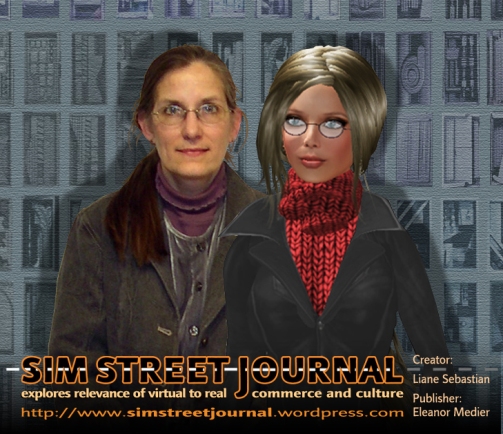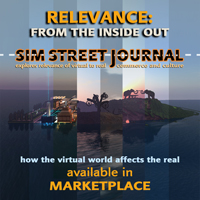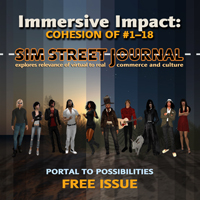Enter the Clash of Realities
By Eleanor Medier/Liane Sebastian.
People can identify so much with their alter-egos online, the definition of self is expanded. No longer is an avatar only limited to activities in-world; today, social media blends more and more with virtual existence.
Sadly, the real society lags behind both in recognizing these created self-portraits and in allowing them the freedom and expression of their owners.
 Facebook gobbles up avatar accounts for breakfast. Each day, more assumed selves discover that their communication rights are revoked because they do not have social security or driver’s license numbers. Poof! Gone are thousands of friends, contacts, customers, and a network that reaches every region of the real world.
Facebook gobbles up avatar accounts for breakfast. Each day, more assumed selves discover that their communication rights are revoked because they do not have social security or driver’s license numbers. Poof! Gone are thousands of friends, contacts, customers, and a network that reaches every region of the real world.
Facebook now rules behavior and decorum, without the recognition or understanding of how important second lives can be.
First, why does an online personality wish to remain anonymous? A recent article portrays the reasons well. To paraphrase:
1. Keep professional and private lives separate. Think beyond avatars to pen names or stage names. Many real life entertainers do not wish their fans to know how/where to reach them.
2. Obtain therapy or assistance without prejudice. Health professionals are experiencing new ways to help those in need. Many clients can confide or cope with deep issues under the cloak of protection from real dangers.
3. Try roads not travelled. For many in difficult real circumstances, the virtual world is a second chance at opportunity or even happiness. For the disabled, it is an unprecedented chance of having at normal freedoms the firm take for granted.
4. Fulfill fantasies. This is both good and bad, as building a dream house can be rewarding, so can practicing sexual experimentation be psychologically damaging (under the guise of “outlet”).
5. Have relationships not possible in real life. This is one of the biggest reasons residents are in Second Life®—friendships made all over the world. Those who get to know each other well usually do share real life contact information and often really do meet.
6. Emotional balance. Those who are isolated can find new social lives without leaving their houses. That means they can also find cyber romance. The notion of fidelity is challenged by those in unhappy real relationships that seek relief in the virtual, and feel it is not cheating if not real.
So, ask this question:
What would happen if virtual worlds decree that residents can only use their real names?
It would be a VERY different world!!! All Profiles would provide real photos and contact information. The environment would change, for good and for bad:
1. It would become more confrontational. If friends and family are watching/participating, then the same social issues follow like a shadow. Yet it is also a good arena to connect in new ways and across great differences. Real identities may contribute to improved real relationships, as it curtails role play and allows a new arena of communication. Gone would be the escape from unhappy circumstances. Virtual worlds are highly seductive and distracting, so handling problems with others in new ways may be a safer arena, and more convenient, for nurturing relationships.
2. There would be less fantasy and role play. This also means less fun. The majority of residents use Second Life as an escape from the real. It is a place to forget the problems of the day and explore potentials not otherwise possible. Yet the experimental outlet would shrink if eyes from the real world are watching.
3. Reality would become more complex. Just as email and Facebook are additive, so would keeping up with communications and responsibilities extended into the virtual world. Yet, it would also become more of a tool. Businesses can have a wider reach and gain all the advantages of this potential.
4. Society would fracture more between the have’s and the have not’s. Already the technocrats have advantage. Computer skills become as necessary to education, entertainment, and business as being able to read.
5. Promotion expands. Building two careers is not efficient. Bringing credentials from real life in-world matters professionally. And any pseudonyms used in real life do transfer to the virtual. If the virtual worlds require the use of real names, this can be accomplished anyway. Several therapists, lawyers, and musicians have achieved this fusion. It is a choice now, without being mandated.
6. Creativity would be either crippled or curtailed. To experiment and try roads not travelled is one of the virtual world’s greatest gifts. Being able to test new ideas often translates back into the real world through gained skills and experience. If family, friends, and associates are watching, most people will not be as imaginative.
7. There would be more monetary incentive to work online. If all the interactions are reflective of real people and enterprises, gone will be the poor exchange rate. Pixel properties will always cost less than real properties, but most products and services won’t be sold for so little. Similarly, it will be more possible to use the advantages of the virtual to build real enterprises.
8. New levels of protection will sprout. Defense against pests and stalkers is essential. Any successful person already has more incoming email than can be answered. If all contact information increases accessibility, so will the layers to resist.
9. Self-awareness will be more limited. With freedom of choice also comes decisions. It is through decisions that people discover what is important. Having no constraints of real responsibilities, those choices reveal values even more than the real world can! But sadly, it opens the door for many devious players and scam artists. Always remember that being on the internet is like being on a busy city street.
10. More secret locations and techniques will emerge. If there is a will, there is a way. Sexual fantasies will always find outlets, even if difficult to obtain. That Second Life has such a strong sexual component —from romance to pornography—does hold it back from respect and use in the real world. But making identities real will only drive this activity elsewhere. Just like trying to regulate alcoholism with prohibition, limiting identities will not curtail prostitution, BSDM, or psychological/emotional abuse. Rather, it forces taking a position.
11. Idealism erased. Avatar appearance will also need correspond if following this reality-quest to its limit. Perhaps real photos would be submitted so the software can construct and provide a look-alike. For those who are fat and ugly in real life, this disadvantage will follow. Currently, in a world where all people are beautiful on the surface, they becomes more distinguished by character on an even playing field. Perhaps for the disabled, of which there is a large percentage, it may be allowed that they can leave the wheelchairs behind.
12. Emotional risk shifts. Although not good for the therapists who can assist the needy who have a freedom to seek help, making virtual reality more real will cut down considerably on deception. If used for dating, reality always must enter anyway, so the sooner the better. Also much heart-break can be saved for those who fall in love with illusions. But the emotional risk shifts to being exposed to the real social netword. It may mean people behave better, but it also takes away a safety net.
The pros and the cons of only using real identities online are complex. But the use of the virtual world as an extension of the real one is here to stay. So is there any way to defend against such an attack on freedom of identity? Does the possibility of terrorists using the medium or other illegal activity justify the crackdown? Will less hearts be broken who fall in love with masked images that deceive?
Facebook demands real identities. Second Life encourages anonymity. Yet, the real question should not come from the inside out, but from the outside in. The issue is much larger than avatars, even with a huge SL network on Facebook. The fluid nature between is being lost. And if SL requires reality, alternative social networks will cease to exist as well. Tools are determined by use. A hammer can drive nails or be used as a weapon. Technology is the determinant of where the human rights tires hit the road of possibility. Yesterday it was privacy that became threatened. Today it is identity.
•••••••••••••••••••••••
JOIN THE SIM STREET JOURNAL GROUP IN FACEBOOK FOR EXCLUSIVE FEATURES
•••••••••••••••••••••••
PLEASE SEE THE IN-WORLD SPONSORS FOR SIM STREET JOURNAL #11
Enjoy different, but related, issue versions: online and in-world (available at the Second Life® SSJ office (Innu 40, 36, 1650).
Back issues are available on MARKETPLACE).
— The in-world magazine has topics that relate to those who understand the virtual context, including photographs, parallel articles. It has tabs for information landmarks, and web links.
— The online magazine expresses what the virtual world offers the real one. It is a mirror that reflects parallel articles, hot topics, and provides more links.Contributions are encouraged if covering topics relevant to real world readers.
Please see the INDEX for all contributors and articles.
Contributions are encouraged if covering topics relevant to real world readers.
Comments and opinions are also encouraged: simstreetjournal@gmail.com
Advertising Opportunities to reach subscribers and viewers both in-world and out
– – – – – – – – – – – – – CONTACTS:
Sim Street Journal explores the relevance of virtual to real commerce and culture.
ONLINE: https://simstreetjournal.wordpress.com/
FACEBOOK: https://www.facebook.com/simstreetjournal
IN-WORLD: http://maps.secondlife.com/secondlife/Innu/40/36/1650
MARKETPLACE: https://marketplace.secondlife.com/stores/148961
EMAIL: simstreetjournal@gmail.com
——————-









